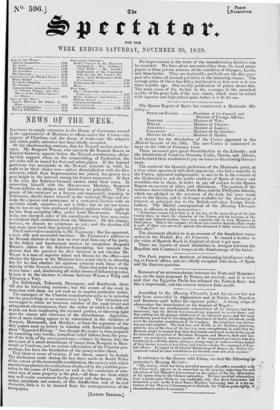NEWS OF THE WEEK.
ELECTIONS to supply vacancies in the House of Commons, caused by the appointment of Members to offices under the Crown—the progress of Chartism, and the decay of trade—are the subjects with which public attention has been chiefly occupied.
Of the electioneering contests, that for Newark excites most in- terest. Mr. Sergeant WILDE, who succeeds Sir ROBERT ROLFE as Solicitor-General, appears before the Newark constituency, claim- ing their support when, on the reassembling of Parliament, the 11CW writs will be issued for that and other places. If the learned gentleman was acceptable to the Newark Liberals in 1837, be ought to be their choice now—unless dissatisfaction with the Go- vernment, which their Representative has joined, has grown to a great height in the interval among his former supporters. If that is the case, the Solicitor-General cannot claim their votes. In connecting himself with the MELnotaxo Ministry, Sergeant WILDE forfeits no pledges and abandons no principles. That a person of his eminence as a lawyer, and respectable standing in Parliament, should fasten himself to the tottering Whigs and un- dergo the expense and annoyance of a contested election with an uncertain result, surprises us not a little ; but we are not aware that he has at any time professed political opinions which ought to bar him from accepting office under Lord Mnr.uounNE. Though he has not changed, some of his constituents may have seen cause to withdraw their confidence from the Ministers. Of this change, however, we discern no symptoms as yet ; and the election will turn more upon local than general politics.
The Conservative candidate is Mr. TIIESIGER ; like his opponent, a most able and successful barrister. Mr. THESIGER'S address to the Newark electors is the best we ever read from one of his party. In the fullest and handsomest manlier he recognizes Sergeant WILDE'S claims to tile Solicitor-Generalship, but reminds the electors that the question for their decision is not whether Mr. WILDE is a man of superior talent and fitness for the office—not whether the Queen or the Ministers have acted wisely in choosing him for it—but whether his opinions coincide with those of the majority of the Newark constituency. Upon that point he is ready to join issue; and, disclaiming all unfair means of influencing votes, he puts it to the electors to choose between WiLux a Whig and TBESIGER a Tory. For Edinburgh, .Falmouth, Devonport, and Southwark, there will also be interesting contests ; but the events of tile week in connexion with them are not such as to require particular notice.
The managers of the Chartist examinations seem to be spinning Out the 'proceedings to an unnecessary length. The witnesses are encouraged to relate an immense number of the most trivial and ununportant circumstances, from the midst of which it is difficult to pick out facts implicating the accused parties, or throwing light upon the causes and character of the disturbances. Apprehen- mons of more rioting appear to be entertained in the vicinities of hewport, Monmouth, and Merthyr; at least the reporters of the daily papers send up letters to London with formidable headings about "Expected Risings:" but, though the reader is thus prepared for something very terrific, immediate relief follows from the peru- sal of the body of the correspondence,—whence be learns, that the movement of a small detachment of troops from Newport to Mon- mouth or Caerleon, and no certain information of the Chartist pro- ceedings, has been the foundation of the penny-a-line alarm.
That there is cause of anxiety, if not alarm, cannot be denied. The disclosures made during the last three weeks in South Wales of time extent of the treasonable conibination, the secrecy with winch mischief was plotted, the enthusiasm displayed by the youthful gene- ration in the cause of Chartism, as well as the connexion of edu- cated men of some property in the plot,—all these are filets which may well excite uneasiness for the present and the future. Of the causes, proximate and remote, of this disaffection, and of its real character, little is to be learned from the correspondence of the newspapers.
No improvement in the trade of the manufacturing districts can be recorded. We have given accounts either from the local news- papers or from private sources, of the condition of Glasgow, Leeds, and Manchester. They are deplorable, and hold out the dire pros- pect of a winter of unusual privation to the labouring classes. The average price of wheat has fallen, but bread is as dear now as it was three months ago. Our weekly publication of prices shows this. The main cause of tile decline in tile averages is the wretched quality of the great bulk of tile new wheat, which must be mixed with superior and high-priced grain before it is fit for use.


























